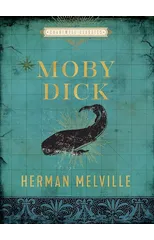"I prefer not to," he respectfully and slowly said, and mildly disappeared. Academics hail it as the beginning of modernism, but to readers around the world--even those daunted by Moby-Dick--Bartleby the Scrivener is simply one of the most absorbing and moving novellas ever. Set in the mid-19th century on New York City's Wall Street, it was also, perhaps, Herman Melville's most prescient story: what if a young man caught up in the rat race of commerce finally just said, "I would prefer not to?"
Herman Melville
Herman Melville (1819-1891) was an American novelist, poet, and short story writer best known for his novel "Moby-Dick," a complex and symbolic work that explores themes of obsession, fate, and the struggle between good and evil. Melville's writing style is characterized by its rich symbolism, philosophical depth, and exploration of existential themes. His other notable works include "Typee," "Billy Budd," and "Bartleby, the Scrivener." Melville's contributions to literature have had a lasting impact on the development of American literature, particularly in the genre of the novel.




